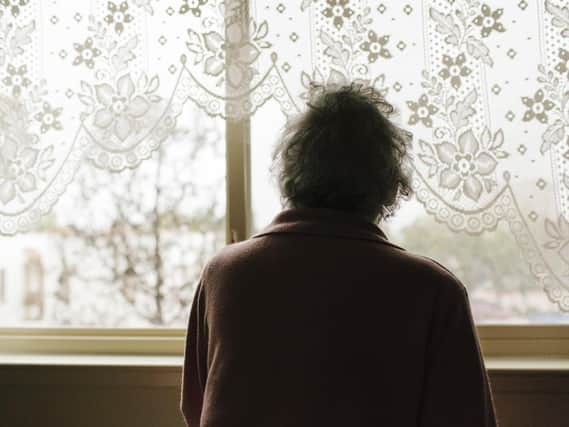"Avoidable" hospital admissions for dementia patients sharply rise as charity points finger at lack of social care funding


The number of people with dementia being rushed to hospital for “avoidable” admissions has sharply risen over the past four years, new data shows.
A rise of some 27 per cent of admissions has been blamed by the Alzheimer's Society on gaps in social care funding. The charity say that poor care is leaving vulnerable people unprotected from infections, falls and dehydration.
Advertisement
Hide AdAdvertisement
Hide AdSome 65 per cent of all emergency admissions of people with dementia in 2019 were for avoidable illnesses and injuries caused by failures in care.
The figures cover the period of 2015-2019, sparking concerns that the situation may have further deteriorated during the pandemic.
There are 850,000 people in the UK living with dementia, including more than 76,000 in the Yorkshire and Humber region.
The charity have launched a petition for urgent social care investment after further data showed 60 per cent of people in Yorkshire and the Humber said future care was something they worried about.
Advertisement
Hide AdAdvertisement
Hide AdIn a supporting survey of unpaid dementia carers, almost half (48 per cent) reported that they had performed tasks they felt unqualified to carry out because of a lack of support, and as a result, they reported three-quarters (72 per cent) of people with dementia having medical issues at home.
Last week, the government received criticism from Labour and care organisations for only including a scant reference to social care reforms in the Queen’s Speech.
Boris Johnson made the social care crisis one of his key priorities for government when he took office in 2019, and has said that a consultation will be launched in this parliamentary session for the promised reforms.
Derek Brown, 70, from Northallerton, is supporting his wife Margaret through dementia. He said: “Getting proper help was so tough for the first year or so. It felt like there was so much hard work just to find out the basics. And I passionately believe that isn’t fair.
Advertisement
Hide AdAdvertisement
Hide Ad“It’s bad enough that we need charities to tell us what benefits we are entitled to, like the Attendance Allowance or a blue badge.
“Through my research, I discovered people living with dementia are entitled to a council tax discount – but councils don’t make this easy to claim, at a time in life when you need help the most.”
Mr Brown said he has struggled to persuade Hambleton Council to backdate his claim and has since launched a parliamentary petition for a change in the law.
Alzheimer’s Society’s investigation found three in 10 people with dementia had experienced avoidable falls (29 per cent), one in six missed medication (16 per cent), one in five hurt themselves in the house (22 per cent) and one in nine (11 per cent) were rushed to hospital in an avoidable emergency.
Advertisement
Hide AdAdvertisement
Hide AdCampaigners including Scarborough-based Mike Padgham, chairman of the Independent Care Group are calling for social care to become free at the point of need in a similar model to the NHS.
Judith King, head of services at Alzheimer's Society said: “Decades of chronic underfunding and neglect have led to a care system that’s inadequate and deeply unfair – the pandemic has exposed these failings like never before. People with dementia have been worst hit, accounting for over a quarter of all deaths and many more rapidly deteriorating from lockdown’s knock-on effects; family carers are exhausted.
“This cannot be the kind of society that we expect today and that we want to grow old in - never again must people affected by dementia face such devastation.
A Department of Health and Social Care spokesperson said: “We are committed to significantly increasing research funding to improve detection and care for people living with all kinds of dementia, and as part of our 2020 Challenge on Dementia, the government has already spent £344 million on dementia research in the past five years.
Advertisement
Hide AdAdvertisement
Hide Ad“We have pledged to improve adult social care to give everyone who needs care the dignity and security they deserve and are committed to bringing forward a long-term plan to reform the social care system later this year.”